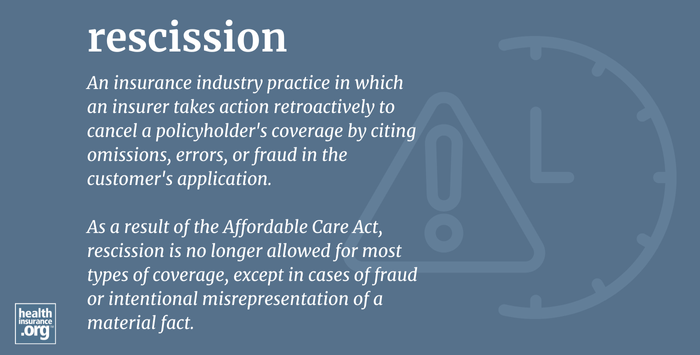
What is rescission?
Rescission is an insurance industry practice in which an insurer takes action retroactively to cancel a policyholder's coverage by citing omissions, errors, or fraud in the customer's application. As a result of the Affordable Care Act, rescission is no longer allowed for most types of coverage, except in cases of fraud or intentional misrepresentation of a material fact.1
Recission was used in the individual market pre-ACA because that market was medically underwritten in most states.2 That meant enrollees had to answer a fairly comprehensive medical history questionnaire as part of the application process, and applications could be rejected based on the applicant's medical history.
If an application was accepted and the enrollee later had a medical claim, the insurer could double-check to make sure that the claim wasn't related to a pre-existing medical condition that hadn't been disclosed on the application (a process known as post-claims underwriting). If it was, the insurer was allowed to rescind the policy, meaning they would refund all of the premiums that had been paid and it was as if the coverage had never been in force. This would mean that no claims would be paid under the policy, so claims that had previously been paid could be retroactively retracted.
But the ACA eliminated medical underwriting in the individual market, which means insurers no longer ask about medical history when someone applies for coverage. So the ways in which an applicant could misrepresent material facts are much more limited now than they used to be.
The ACA's rescission rules do not apply to coverage that isn't subject to ACA rules. This includes short-term health insurance, Farm Bureau plans (in states where they're offered), health care sharing ministries, fixed indemnity plans, etc.
Footnotes
- "Rescission" HealthCare.gov. Accessed Oct. 8, 2024 ⤶
- "Pre-Existing Condition Prevalence for Individuals and Families" KFF.org. Oct. 4, 2019 ⤶


